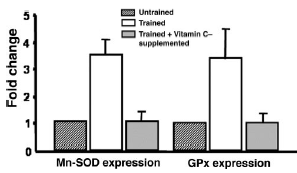|
Definition: "An ergogenic aid is any substance or phenomenon that enhances performance "
|
|
||||||||
23.08.2010 |
|
|
Vitamin C negates effects of endurance training
If you want to improve your condition, you're better off not taking high-dose vitamin C pills. In fact, you may be best off not taking any supplements that neutralise the effects of free radicals at all. In 2008, physiologists at the University of Valencia published the results of a study in which a daily dose of 1 g vitamin C undermined the effect of 8 weeks of running training.
It's the same story with free radicals as what we now know about cholesterol. At first researchers lumped them all into one category: 'bad'. After all, free radicals damage cells and speed up the aging process. Anti-oxidants, such as vitamin C and E, which neutralise free radicals, were 'good'.
But we're now starting to build up a subtler picture. Like we now know there is 'good' cholesterol and 'bad', there are also 'good' and 'bad' free radicals. For example, the free radicals that are released in your muscles when you do intensive exercise and burn high amounts of nutrients are 'good'. At least, according to the Spanish study they are.
The researchers got 14 men aged between 27 and 36 to cycle for 40 minutes 3 days a week for 8 weeks. When the experiment started they cycled at 65 percent of their VO2max. Every 2 weeks the researchers increased the intensity by 5 percent. Half of the men took 1 g vitamin C at 9 o'clock with their breakfast.
The researchers did a similar experiment with rats too.
By the end of the training period the vitamin pill had halved the increase in the VO2max, in both the rats and the men. The researchers determined the rats' endurance capacity by getting them to do an exhaustion test: the animals had to run until they literally dropped.

According to the table, the effect on the VO2max is not significant, but you can ignore that. "There were data from only 5 men, and thus the study may not have been adequately powered to find a difference", the Spaniards write.
The vitamin pill undermines the muscle cells' adaptation to exercise, the researchers discovered. Muscle cells arm themselves against free radicals by producing higher amounts of protective enzymes such as manganese super oxide dismutaste (Mn-SOD) and glutathione peroxidase (GPx). But this didnít happen in the rats that were given vitamin C.
Endurance training switches on the key molecule PGC1alpha in muscle cells. One of PGC1alpha's functions is to increase the amount of mitochondria in the cell. It does this via the transcription factors nuclear respiratory factor 1 [NRF-1] and mitochondrial transcription factor A [mTFA]. Muscle cells also increase the number of mitochondria through the same mechanisms.
The figure above shows that vitamin C undermines this training effect too. The mitochondria are the molecular power houses that convert nutrients into energy.
It seems that muscles need free radicals, the researchers state. "Thus, the common practice of taking vitamin C supplements during training (for both health-related and performance-related physical fitness) should be seriously questioned."
It's worth mentioning however that the research results only apply to young people. The mechanisms through which cells react to stress become less effective with age. Research on the effects of strength training has shown that people in their sixties build up more muscle tissue if they also take vitamin C and E. It seems that vitamin C inhibits the development of muscle tissue in young people. [Br J Nutr. 2006 May;95(5):976-81.]
Another factor is the length of time that supplements are taken. The Spanish study lasted 8 weeks. In a Danish study researchers got their subjects to train for 4 weeks longer and reported no negative effects from taking antioxidants. But they didn't report any positive effects either.
Source:
More:
|
|


